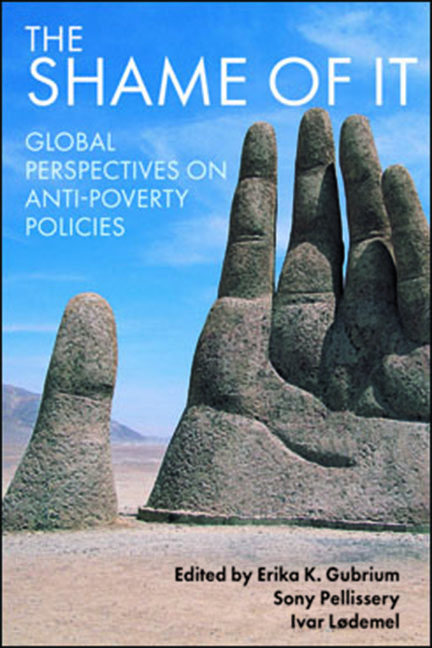Book contents
- Frontmatter
- Dedication
- Contents
- Notes on contributors
- Acknowledgements
- Preface
- one Resetting the stage
- two New urban poverty and new welfare provision: China’s dibao system
- three Thick poverty, thicker society and thin state: policy spaces for human dignity in India
- four Self-sufficiency, social assistance and the shaming of poverty in South Korea
- five ‘Not good enough’: social assistance and shaming in Norway
- six Pakistan: a journey of poverty-induced shame
- seven Separating the sheep from the goats: tackling poverty in Britain for over four centuries
- eight ‘Food that cannot be eaten’: the shame of Uganda’s anti-poverty policies
- nine Shame and shaming in policy processes
- ten Towards global principles for dignity-based anti-poverty policies
- Index
Preface
Published online by Cambridge University Press: 03 February 2022
- Frontmatter
- Dedication
- Contents
- Notes on contributors
- Acknowledgements
- Preface
- one Resetting the stage
- two New urban poverty and new welfare provision: China’s dibao system
- three Thick poverty, thicker society and thin state: policy spaces for human dignity in India
- four Self-sufficiency, social assistance and the shaming of poverty in South Korea
- five ‘Not good enough’: social assistance and shaming in Norway
- six Pakistan: a journey of poverty-induced shame
- seven Separating the sheep from the goats: tackling poverty in Britain for over four centuries
- eight ‘Food that cannot be eaten’: the shame of Uganda’s anti-poverty policies
- nine Shame and shaming in policy processes
- ten Towards global principles for dignity-based anti-poverty policies
- Index
Summary
The worst thing about living in extreme poverty is the contempt – that they treat you like you are worthless, that they look at you with disgust and fear and that they even treat you like an enemy. We and our children experience this every day, and it hurts us, humiliates us and makes us live in fear and shame.
This is the first volume to take seriously the policy implications of the experience of this Peruvian mother. It is an experience shared by people living in poverty in countries as disparate as Norway and Uganda, the UK and Pakistan, South Korea, China and India. It is probably true of people in poverty everywhere.
Certainly, that is the view of Amartya Sen, Nobel Laureate, who has had a profound influence on recent global debates about poverty reduction. He argues that shame, specifically ‘the ability to go about without shame’, lies at the ‘irreducible absolutist core in the idea of poverty.’ This link between poverty and shame is important for at least four reasons that are evidenced in this volume and in two companion volumes by the same research team. First, shame hurts. Physiologically shame is recognised by increased pro-inflammatory cytokine activity and cortisol; psychologically it is associated with depression, anxiety and suicidal ideas. To live in shame every day adds to the pain of poverty.
Second, shame, while internally felt, is externally imposed by those of us who are not poor: the ‘they’ referred to by the Peruvian mother cited above. We impose shame whenever we speak of ‘the poor’ as an undifferentiated group; when we refer glibly to people in poverty as scroungers, lazy or good for nothing; when we justify our relative affluence in terms of our ability, hard work and motivation; or when we avert our gaze by not, for example, acknowledging a person begging in the street.
Third, social psychology reveals that shame is the most debilitating of the emotions, causing people to retreat socially, to lose faith in themselves and to find their sense of agency eroded. While we might naively wish to encourage people in poverty to help themselves by shaming them, we are, in fact, more likely to have the opposite effect. Shame undermines people's ability to help themselves.
Finally, and for similar reasons, policies that stigmatise and are shaming are likely to be ineffective. They demoralise and reduce individual agency.
- Type
- Chapter
- Information
- The Shame of ItGlobal Perspectives on Anti-Poverty Policies, pp. x - xivPublisher: Bristol University PressPrint publication year: 2013



